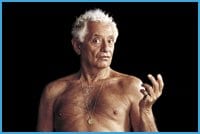If you want the latest dish on everyone who’s anyone in the entertainment world, make sure you sit next to Toronto actor Louis Negin at a dinner party. In the course of an hour’s conversation you can expect juicy tidbits on everyone from Joan Collins to Marilyn Monroe — not to mention Negin’s own sensational history.
If the dinner invite never arrives, you could always join the audience at Negin’s new show, The Glass Eye, premiering Tue, Jun 10 for Luminato. The sprightly thespian promises to reveal maybe not all but a sizable chunk of the good stuff.
“People always ask me if these stories are real,” Negin says coyly. “I’m not even sure anymore. Sometimes our secret lives are so secret that we don’t understand them ourselves.”
Negin wrote the show with famed playwright and Robert Lepage protégé Marie Brassard, a friend of more than 15 years. After seeing his 2005 one-man show Polo’s Fantasy, a collection of semibiographical stories, she encouraged Negin to go one step further and expose the show’s real-life roots. The two hunkered down for three months of collaboration — an experience that Negin says was as intense as it was rewarding.
“It was like going to psychotherapy,” says Negin. “I told her things I’ve never told anybody. If I started being phoney she’d say, ‘Stop! No Stratford!'”
One of Brassard’s early exercises was to bring in every film Negin has appeared in and force him to view his physical and professional evolution over the years. One film in particular had a powerful, unsettling effect on the actor.
“We were watching this one movie and this beautiful guy with full lips came on. I fell totally in love and asked her, ‘Who is that guy?’ And it was me!
“I started bawling,” he says. “I just didn’t want to see it… to see myself back then.”
After that it was easy for Brassard and Negin to peel back the layers of his life to craft a story that is one part fancy and three parts fact.
The story opens with the tale of Polo, a young boy growing up unhappily in small town Ontario. Like many fey young men Polo is enchanted by Hollywood and dreams of a glamorous life on stage and screen.
Opportunity swaggers into the boy’s life in the form of Mr Canada. The hunky bodybuilder sweeps Polo off to live with him in Montreal and the lad explores the gaieties of life in French-Canadian nightclubs with his hunky conquest.
But fame beckons and Polo succumbs to its siren call. He moves to New York and begins his quest for stardom on and off and Broadway. His toothsome beauty opens plenty of doors, as do a set of killer gams. “At one point he realizes what a great combination he is,” Negin says, “Betty Grable from the waist down and Peter Lorre from the waist up.”
The character Polo allows Negin to pick through a treasure trove of memories and experiences. He fondly recalls the youthful heydays of gay life in New York and London. “I was very lucky to be living in the ’60s,” Negin says. “It’ll never be like that again. I’d go out on Kings Rd for a walk and three days later I’d come home. You were never afraid of anything at the parties — this was before the AIDS crisis of course.
“It was, in a way, very innocent. You’d be walking along and somebody would scream down from the top floor of a tenement, ‘Hey Mister, could you mail this?’ And it was their income tax! That was New York in the ’60s.”
This halcyon period was short-lived. The innocent gatherings turned into hard partying and a lot of Negin’s friends and colleagues became caught up in the chemical haze. “The tragedy of drugs in the ’60s is that it affected everybody, just like AIDS did later on,” he says. “I saw so much damage from it, it’s unbelievable. But what did we learn? Did we learn anything?”
One story in particular still saddens Negin. He becomes quiet when reflecting on the tragic loss of a beloved American icon.
“There was this Howard Johnson’s in Massachusetts,” he says. “We were eating dinner and this couple came in… a tall guy and a girl wearing a babushka. Nobody looked at her. At one point she went into the bathroom for over an hour and when she came out it was the girl everybody knew… the makeup, the white dress that she was falling out of… Marilyn Monroe.
“You really wanted to protect her. You felt that she was extremely vulnerable and you didn’t want anyone to hurt her. It’s almost a joke… ‘I want to protect Marilyn Monroe,’ but it was true.”
One lover surfaces several times in his and Polo’s reminiscences. “I had a friend who was a bodybuilder. Now, what do I know about bodybuilding and bodybuilders? But I certainly get excited and stimulated by them, so suddenly I’m talking about latissimus dorsi and working out. God was he beautiful. But he used to ask me to come with him places because I made him look good by comparison. Well, thanks a lot!”
Negin is relishing this fuller awareness of his own history — and the chance to offer insights to younger queers in the audience.
“I think the legacy is that we’re lucky to have survived,” he says. “You have to use it, and to share the knowledge you’ve accumulated. Otherwise it’s wasted.”

 Why you can trust Xtra
Why you can trust Xtra


